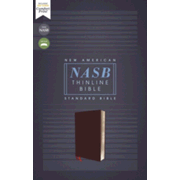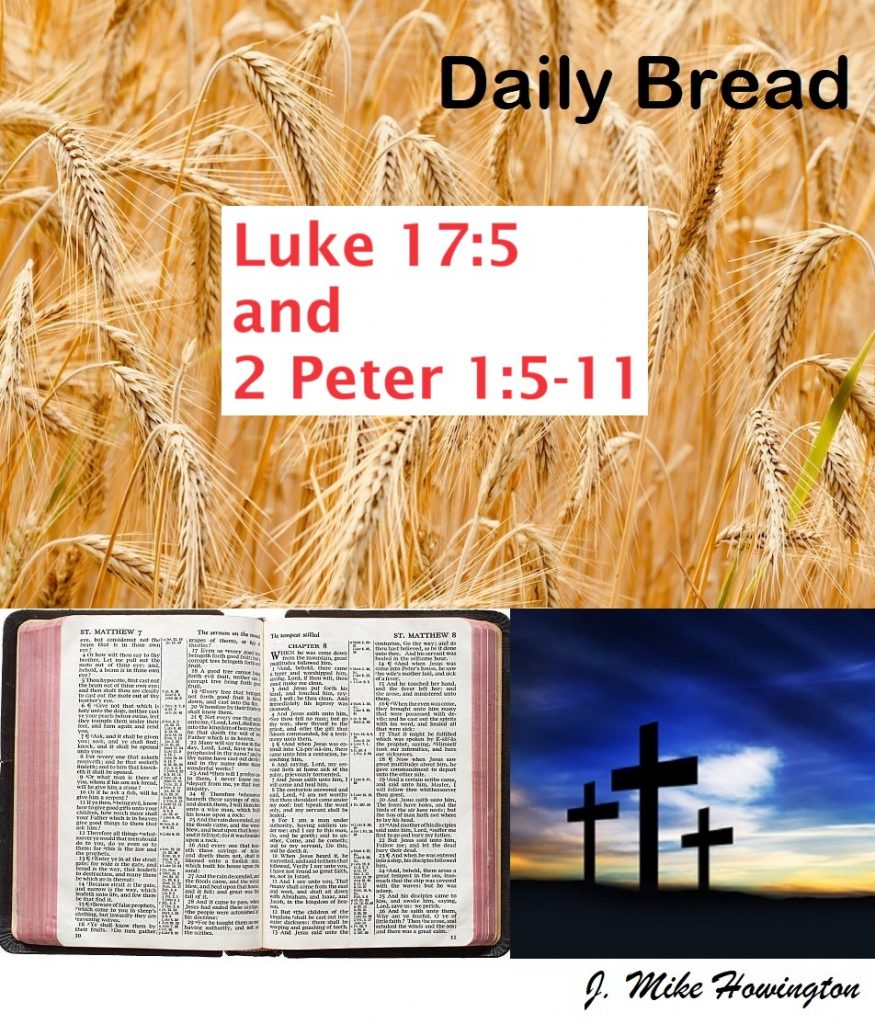The Apostles felt they needed more faith and they asked Jesus for guidance (Luke 17:5).
According to Romans 12:3, God has given each believer “a measure of faith.” That phrase, “a measure of faith,” tells us something powerful about faith and the Christian walk and how it applies to us.
Peter later writes that we must give diligent effort to increase our faith (2 Peter 1:5-11).
God also calls people to faith and builds them up when God’s Word is taught, or learned, in church and other settings, i.e.;
- studies at home,
- in the classroom,
- in Bible studies meetings,
- in ordinary conversation,
- and elsewhere.
Jesus strengthened the faith of His disciples by teaching them the living and active Word of God (Luke 17:5–6; Hebrews 4:12–13).
To nurture our faith, we should study what the Bible reveals about Faith. Both the written and the spoken Word of God produce faith (Romans 10:17). 1
Luke 17:5 The Source of FaithThe apostles asked Jesus to increase their faith but there is both a divine and a human side of faith. (Thiessen, pp. 273-274) Jesus is “the author and the perfecter of faith” (Hebrews 12:2). Faith is a gift of God (Romans 12:3; 2 Peter 1:1). Faith is sovereignly given by the Spirit of God (1Corinthians 12:9; Galatians 5:22). The spoken and the preached word of God produce faith (Romans 10:17; Acts 4:4). Prayer is also a means of faith (Luke 22:32). The exercise of the faith we have will be a means whereby our faith will grow (Matthew 25:29).
To help the Apostles’ faith, Jesus speaks of the unlimited power of faith. And then, using the parable of the obedient servant Jesus shows them that humility is the groundwork of faith (Luke 17:7-10). 2
2 Peter 1:5, 6 – Give All Diligence to Adding to Your FaithGod has given us everything we need for life and godliness (2 Peter 1:3). He has an infinite supply of what we need to grow.
We begin our walk with the Lord with faith, and adding to that faith progresses into virtue, knowledge, self-control, perseverance, godliness, brotherly kindness, and love. Love is the capstone of all God’s work in us. (2 Peter 1:5, 6)
The translation to “add to your faith” comes from the literal in the ancient Greek “Lead up hand in hand.” This alludes to the chorus in a Grecian dance, which called for dancing with joined hands. 3
We are made spiritual sons and daughters and partakers of the divine nature, so growth in the Christian life doesn’t just happen to us. We are supposed to give all diligence to our walk with the Lord nurturing our faith, knowledge, self-control, perseverance, godliness, kindness, and love.
The scope of the list that faith progresses into demonstrates that God wants us to have a well-rounded Christian life, complete in every fashion. We can’t be content with an incomplete Christian life.
We are required to give all diligence to the listed qualities, working in partnership with God to add to them. 4
Many Christians, lack these qualities because they lack in their knowledge of God – knowing Him relationally in an increasingly fuller and deeper sense. They are characterized as:
- barren,
- unfruitful,
- shortsighted, even to blindness,
- and forgetting they were cleansed from their old sins.
(2 Peter 1:8, 9)
2 Peter 1:10, 11 – Nurture Your Faith to Make Your Call and Election SecureFaith works godliness and produces effects that no other grace in the soul can. The knowledge of God and the truth about Jesus Christ is usually understood to be the knowledge of God’s saving grace in Christ Jesus.
By doing the things spoken of in 2 Peter 1:5-7 (faith, virtue, knowledge, self-control, perseverance, godliness, brotherly kindness, and love), we can be confident that God called us, and that we are His chosen (elect) (2 Peter 1:10).
As we see these things in our lives, we know that our lives are becoming more like the nature of Jesus. It shows that we are being “conformed to the image of His Son” (Romans 8:29).
In pursuing these things, we keep from stumbling. Continual growth and progress in the Christian life is the sure way to keep from stumbling. (2 Peter 1:11)
Note however, that an unsaved person can do many moral and religious duties. But the things Peter wrote of are matters of the heart and should be evident in anyone “born again.” Simply put, if we are called, if we are elect, then we are born again – and if we are born again, it shows in the way that we live.
______________Affiliate link – SHOP: _______________
_This ad is for my favorite version of The Bible _
_____but click on it to go to the whole store______


NASB Comfort Print Thinline Bible, Red Letter Edition–bonded leather, burgundy (click here)
By Zondervan
The beloved 1995 Edition of the New American Standard Bible is now easier to read with Zondervan’s exclusive NASB Comfort Print® typeface. This edition of the NASB Thinline Bibles is available in a variety of sophisticated designs in a portable, easy-to-read format.
- The full text of the New American Standard Bible, 1995 Edition
- Exquisite, durable covers
- Less than one inch thick
- Double-column format
- Presentation page
- Two satin ribbon markers
- Words of Christ in red
- Exclusive Zondervan NASB Comfort Print 9 point type
Features:
____________________________________________
Consider the Daily Bread email message sent on 3/11/2024 which says,

Luke 17:5 – The apostles said to the Lord, “Increase our faith!” (NASB)
and
2 Peter 1:5-11 – Now for this very reason also, applying all diligence, in your faith supply moral excellence, and in your moral excellence, knowledge, 6 and in your knowledge, self-control, and in your self-control, perseverance, and in your perseverance, godliness, 7 and in your godliness, brotherly kindness, and in your brotherly kindness, love. 8 For if these qualities are yours and are increasing, they render you neither useless nor unfruitful in the true knowledge of our Lord Jesus Christ. … 10 Therefore, brethren, be all the more diligent to make certain about His calling and choosing you; for as long as you practice these things, you will never stumble; 11 for in this way the entrance into the eternal kingdom of our Lord and Savior Jesus Christ will be abundantly supplied to you. (NASB)
To receive the Daily Bread email messages, free on Mon., Wed., and Fri., in your email inbox, just fill in the form below or send an email, and ask to be added, to jmikeh@jmhowington.com
Click Here to Scroll To Top of the Page
Cited References:
- Henry C. Thiessen (revised by Vernon D. Doerksen), Lectures in Systematic Theology (Grand Rapids, MI: Eerdmans, 1981), pg. 273.
- Henry H. Halley, Bible Handbook (Grand Rapids, MI: Zondervan Publishing House, 1992), pg. 516.
- William Newton Clark, An Outline of Christian Theology (New York, NY: Scribner, 1901)
- David Guzik, Commentary on Philippians 3, (Enduring Word, https://enduringword.com/bible-commentary/2-peter-1/)

